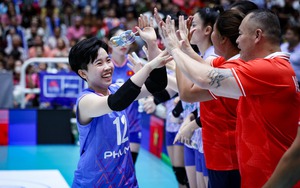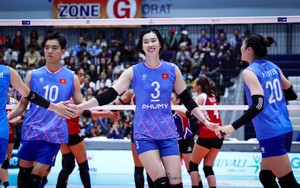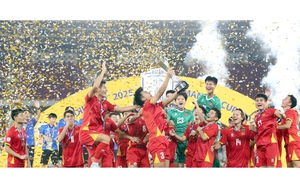
Vietnam rides volleyball, football success to regional prominence, but global challenges remain
From the volleyball court to the football pitch, Vietnam is enjoying a golden spell in regional sports.
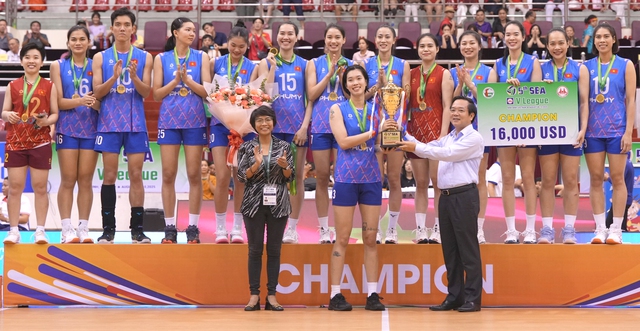
The women’s national volleyball team stunned regional powerhouse Thailand to win the second leg of the 2025 Southeast Asian Volleyball League (SEA V.League), just two weeks after the men’s U23 football team clinched their third straight ASEAN Football Federation title.
While rankings and trophies suggest a nation on the rise, both teams still face steep hurdles on the global stage.
Volleyball’s golden generation
Just hours after Vietnam’s volleyball triumph over Thailand, sports data platform Volleybox updated its global player rankings.
In a surprise development, four Vietnamese female players appeared in the top 100: Tran Thi Thanh Thuy ranked 14th with 327.85 points, Nguyen Khanh Dang was 27th with 235.25 points, Nguyen Thi Bich Tuyen placed 85th with 169.25 points, and Vi Thi Nhu Quynh followed in 86th with 169 points.
Volleybox, considered a credible source in world volleyball, calculates rankings based on individual accolades and team performance — a model akin to Transfermarkt in football.
For example, Bich Tuyen gained 25 points from the SEA V.League victory: 10 for the team title and 15 as ‘Best Opposite Spiker.’
Vietnam’s national women’s volleyball team also moved up to 22nd in the world rankings, now trailing archrival Thailand by just one position.
The country’s rise in volleyball has been decades in the making.
Its current squad is being hailed as a ‘golden generation,’ with several players boasting years of experience and stints in professional leagues abroad.
Captain Tran Thi Thanh Thuy has played in Taiwan, Japan, Turkey, and Indonesia.
Middle blocker Tran Thi Bich Thuy, now with South Korea’s GS Caltex, has become a key figure after being dropped from the national team just a year ago.
Other players such as Doan Thi Lam Oanh and Hoang Thi Kieu Trinh have competed in Thailand, while Vi Thi Nhu Quynh is set to join an Indonesian club.
The exposure to international competition has sharpened skills and introduced new tactical insights.
Vietnam’s mental game has improved as well.
In 2023, the team pulled off back-to-back comebacks over South Korea at both the Asian Championship and Asian Games — overturning 0–2 deficits to win 3–2.
Their recent win over Thailand came under similar pressure.
Youth development has also accelerated.
After criticism in 2023 over the lack of emerging talent, the women’s U21 team delivered an impressive performance at this year’s U21 World Championship.
Several players from that squad are being groomed for senior roles.
Rankings tell a partial story
Despite recent gains, some skepticism lingers over the world ranking system.
Vietnam’s rise has been fueled in part by points earned at lower-tier tournaments and regional cups, while top-tier teams often earn fewer points — or even lose ground — in tougher competitions such as the Volleyball Nations League (VNL).
Thailand, for instance, received no points from the SEA V.League despite winning the first leg and performing well in the second, due to FIVB rules prioritizing global events.
Such discrepancies have led to questions about whether current rankings reflect true competitive strength.
Despite a strong regional run, Vietnam remains outside the world’s top 18 — a threshold required to enter the elite VNL, where true global competition awaits.
That remains a steep hill to climb, with limited ranking opportunities left this season.
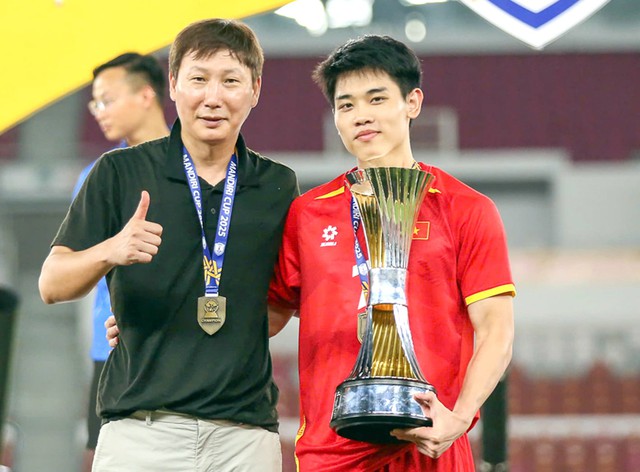
Vietnamese forward Nguyen Dinh Bac (R) and head coach Kim Sang Sik pose for a photo with the trophy after winning the 2025 AFF U23 Championship. Photo: Anh Khoa
Football’s youth triumph mirrors volleyball’s rise
Vietnam’s football scene is also enjoying a youth-fueled resurgence.
In late July, the U23 national team captured its third consecutive AFF U23 Championship title, edging host Indonesia 1–0 in the final.
Head coach Kim Sang Sik made history by winning both the senior ASEAN Cup and the U23 Southeast Asian title within eight months.
More remarkably, both victories came on foreign soil — in Thailand and Indonesia, respectively.
“Coach Kim organized the team well. Against strong or weak opponents, Vietnam imposed their style,” analyst Doan Minh Xuong said.
“Even when conceding possession, they controlled the match tactically — especially on set pieces, which led to several goals.”
The success marks a sharp turnaround after Vietnam’s 0–4 loss to a controversial foreign-heavy Malaysia side in 2027 AFC Asian Cup qualifying.
The country’s long-term football ambitions rest on nurturing this next generation, with promising stars like forward Nguyen Dinh Bac signaling his readiness for senior duties.
While regional titles are a strong foundation, Vietnam’s football program now faces the tougher task of converting youth potential into global competitiveness.
Competing in Asian Cup qualifiers and reaching deeper stages in continental tournaments remain a work in progress.
Bao Anh - Duc Khue - Nguyen Khoi - Huy Dang / Tuoi Tre News
